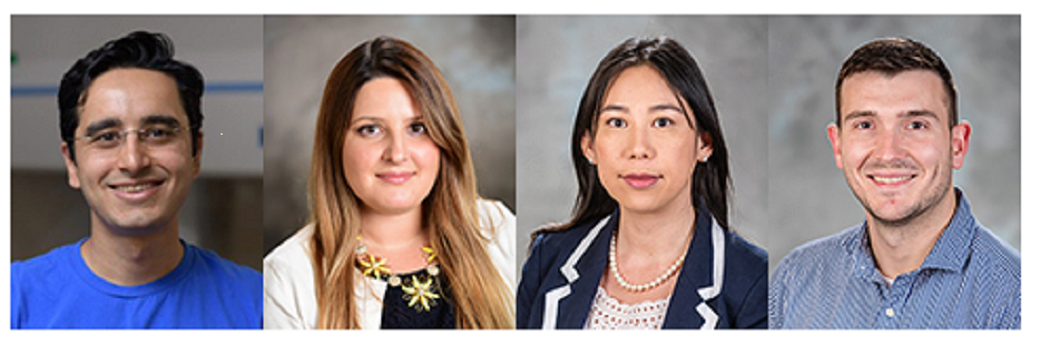
Four faculty members in Georgia Tech’s School of Chemical & Biomolecular Engineering (ChBE), have won 2020 Faculty Early Career Development (CAREER) Awards from the National Science Foundation (NSF): Assistant Professors Saad Bhamla, Fani Boukouvala, Lily Cheung, and Andrew J. Medford.
The CAREER Award is the NSF’s most prestigious award in support of junior faculty who exemplify the role of teacher-scholars through outstanding research, excellent education, and the integration of education and research within the context of the mission of their organizations.
“Having our faculty win four of these awards in a single year is truly remarkable,” says Professor David Sholl, the John F. Brock III School Chair.
Saad Bhamla
Bhamla will receive $994,387 over five years (funded by the Division of Integrative Organismal Systems (iOS) at NSF under the Directorate of Biological Sciences (BIO)) to study “Fast, Furious and Fantastic Beasts: Integrative principles, biomechanics and physical limits of impulsive motion in ultrafast organisms.”
This research will focus on understanding ultrafast motion of slingshot spiders native to the Amazon Rainforest. Bhamla will combine mathematical theory, field experiments and robophysical modeling to establish governing biomechanics of ultrafast motion in slingshot spiders and other ultrafast organisms, including single cells.
In addition to funding research activities, the NSF CAREER Award also supports educational outreach plans. Bhamla's team will develop a Jungle Biomechanics course to bring Georgia Tech students to the rainforest to understand the biomechanics of extreme organisms. In addition, he plans to host high school students to develop frugal science tools for quantitatively understanding the physics of living systems. He also plans on developing bilingual comic books (English/Spanish).
Fani Boukouvala
Boukouvala will receive $546,789 over five years (funded by the Division of Process Systems, Reaction Engineering, and Molecular Thermodynamics at NSF under the Directorate of Chemical, Bioengineering, Environmental & Transport Systems) to study “Machine-Learning Assisted Process Systems Engineering: Hybrid modeling for process optimization, design and synthesis.”
This research will focus on "opening up the black-boxes" of modern Machine Learning (ML) methods and integrating their training with core chemical engineering principles to achieve “Hybridization.” Some of the main reasons that have led to lack of adoption of ML for optimization in the chemical process industry is their black-box nature and lack of guarantee of satisfaction of first-principles, she explains. “The primary objective of our work will be to solve existing mathematical challenges and develop algorithmic tools that will enable the integration of ML and process systems approaches for a diverse set of chemical and biochemical process applications.”
For educational outreach, she will collaborate with Georgia Tech’s Center for Education Integrating Science, Mathematics, and Computing (CEISMIC) in participating in the Georgia Industrial Fellowships for Teachers (GIFT) program and work closely with high school teachers to develop data-sets and case studies for teaching statistics and data-driven decision-making in their classrooms. Teaching modules will also be developed and disseminated to enable the integration of basic data-science principles within core chemical engineering courses such as Kinetics, Thermodynamics, Transport, Process Control, and Design.
In addition, one long-term career outreach objective is to impact the lack of gender diversity in computer-aided and process engineering through female-led professional development events; highlighting of academic and industrial success stories; and collection of data to raise awareness, identify causes, and propose solutions.
Lily Cheung
Cheung will receive $992,174 over 5 years (funded by the Division of Molecular and Cellular Bioscience (MCB) under the Directorate of Biological Sciences (BIO)) to study “Understanding the role of sugar transporters in plant growth.”
This research will focus on identifying the molecules recognized by plant sugar transporters of the SWEET family. Sugar transporters—the proteins embedded in membranes that enable the uptake and release of sugar from cells or subcellular compartments—are critical determinants of plant yield, and understanding their function will guide future efforts to use these proteins to engineer better crops.
For educational outreach, Cheung will develop summer research activities to bridge the gap between plant biology and engineering for students at the K-12 level.
Andrew J. Medford
Medford will receive $565,691 over five years (funded by the Catalysis program under the Division of Chemical, Bioengineering, Environmental and Transport Systems) to study “Computational discovery of oxide-based photocatalysts to create fertilizer from air.”
This research will utilize computational screening approaches to identify new transition-metal compounds that are promising for synthesis of ammonia from nitrogen in air. His team will combine quantum-mechanical simulations, high-throughput screening accelerated by machine learning, and simple process models to discover new materials and establish target metrics for producing fertilizer from air.
His educational outreach efforts will involve the development of a new "Community Conversations" model that will bring student researchers, faculty, and community members together to assess the challenges and opportunities for integrating solar fertilizer production with agricultural technology and infrastructure.
These CAREER award winners thank the many colleagues who provided feedback and advice on initial versions of their proposals, including Professors Ravi Kane, Mike Filler, Hang Lu, Carsten Sievers, Mark Styczynski, Julie Champion, Ryan Lively, Matthew Realff, David Sholl, Chris Jones, and Martha Grover.